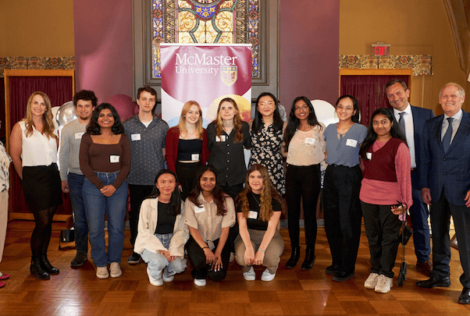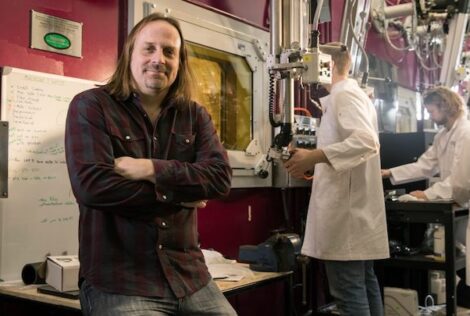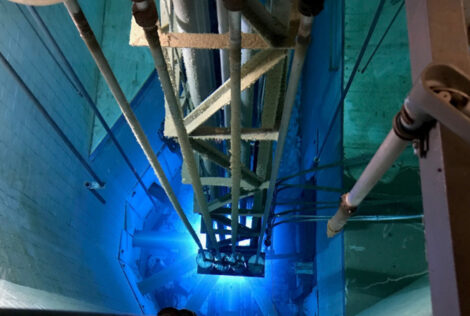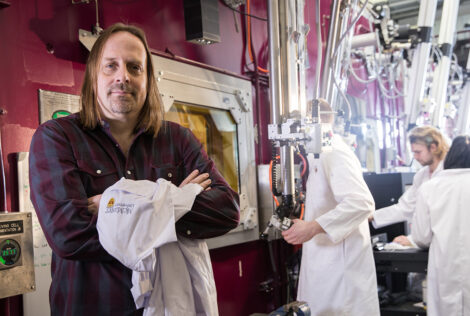
Small Modular Advanced Reactor Training (SMART) program
The vision for the Small Modular Advanced Reactor Training (SMART) program is to provide a globally recognized platform for Small Modular Reactor (SMR) specific training that meets the evolving needs of the Canadian nuclear power sector and provides students with the opportunity for experiential learning, advanced training in nuclear technology and develops important professional skills
This program is made possible by NSERC funding.
SMART represents a unique opportunity for Canada to solidify its leadership in SMR training globally.
McMaster University will host the SMART CREATE program and together with its partners at Waterloo, Ontario Tech University, Royal Military College of Canada, University of New Brunswick and Queen’s University.
SMART represents a unique opportunity for Canada to solidify its leadership in SMR training globally.
McMaster University will host the SMART CREATE program and together with its partners at Waterloo, Ontario Tech University, Royal Military College of Canada, University of New Brunswick and Queen’s University.
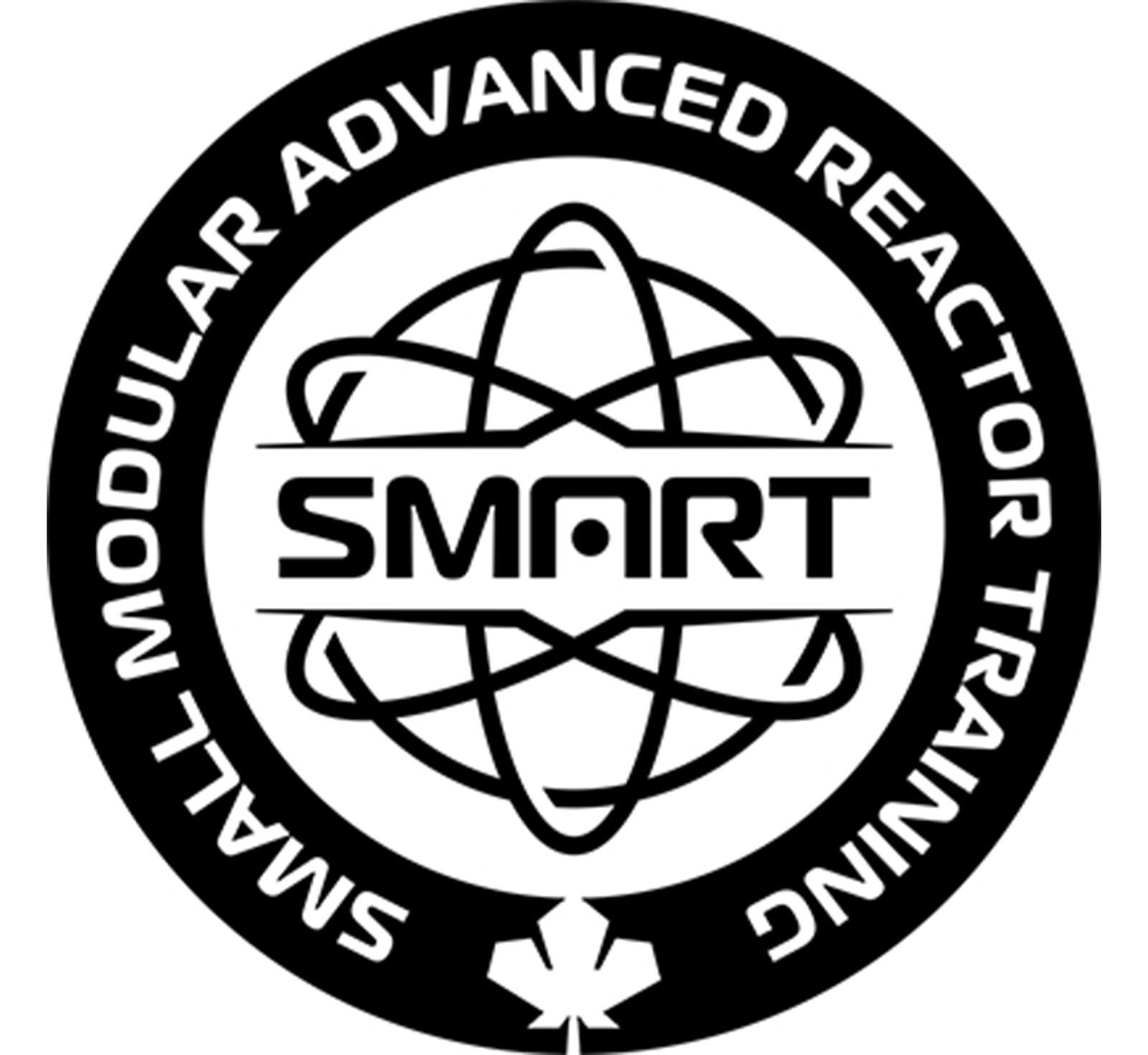
CREATE
The Collaborative Research and Training Experience (CREATE) program is a unique NSERC program focused on training HQP to meet an emerging need in Canada.
It is designed to improve the training and mentoring environment for the Canadian researchers of tomorrow by improving training in areas such as professional skills, communication and collaboration, as well as by providing mentoring and experience relevant to both academic and non-academic research environments.
CREATE supports the training and mentoring of teams of highly qualified students and postdoctoral fellows from Canada and abroad through the development of innovative training programs that:
- encourage collaborative and integrative approaches, and address significant scientific challenges associated with Canada’s research priorities
- facilitate the transition of new researchers from trainees to productive employees in the Canadian workforce

SMART – Key Drivers
In addition to the key drivers, McMaster will offer a module on reactor operations where SMART HQP will experience various aspects of nuclear engineering through participation at the McMaster Nuclear Reactor.
A SMART symposium will also be held each year to provide additional networking opportunities between HQP and industry, government, and academia to keep all SMR stakeholders abreast of the current status and progress of the SMART program. The symposia will include technical presentations from industry and the regulator as well as from HQP who are near completion of their programs. SMART co-applicants will take turns in hosting the SMART symposia at their campus or facility. Undergraduate students in this program will be offered access to all of the above as time permits within their summer internships.
Note: All HQP trained within this NSERC CREATE proposal will receive a SMART Passport, which is a document similar to a conventional passport, to track their progress and training throughout the program. The SMART Passport can then be used during their job search as a prestigious record of their advanced education and training within the SMART program
Future career possibilities
HQP graduating from SMART will emerge from the training program with the powerful combination of well-developed professional skills, detailed SMR knowledge, and demonstrable experience through their SMART Passport records. SMART graduates through participation at this nascent stage in SMR deployment would be well positioned for leadership roles in the evolving SMR industry.
Training program
The training program is designed to provide a stream of HQPs with advanced skills and technical knowledge of SMRs.
The SMART program represents an excellent opportunity to pilot this training on a “first wave” of HQP, with the bulk of the HQP needs in the longer term being met by the continuation of SMART beyond its initial six-year mandate and funded by the SMR industry.
Technical skills
The key focal areas of SMART technical training align with the needs identified by NRCan in the SMR roadmap. These topics include:
- Basic design of SMRS
- Materials performance
- Safety and risk
- Life cycle and spent fuel issues
- In-containment reactor experience at McMaster Nuclear Reactor
Note: For students enrolled in SMART but who may lack some requisite nuclear knowledge, a primer module will be developed so that students from non-nuclear engineering undergraduate programs can be directly recruited into the program.
Professional skills
Based on the needs identified from industry and CAGS, SMART will provide skills-specific training modules in:
- Effective networking and communication
- Entrepreneurship and intellectual property
- Project management and teamwork essentials
- Written communications, publications and grantsmanship
- Job search and employment skills
Note: The SMART Passport will require all HQP to become student (free) members of the Canadian Nuclear Society (CNS) and to attend at least one CNS-sponsored event annually to promote interaction with the Canadian Nuclear Engineering community as a whole.
Dr. Novog has over 25 years of experience in industry and academia and holds an NSERC Senior IRC in nuclear safety. He is the Director of the McMaster Institute for Energy Studies and has been recognized as a leading teacher and researcher in his field.
Dr. Daymond holds an NSERC Senior IRC in nuclear materials, and a Tier 1 CRC in mechanics of
materials. Dr. Daymond will collaborate with Drs. Cook and Kish in the area of SMR materials and aging, and will deliver the SMART-wide course module on nuclear materials and degradation issues.
Dr. Pandey has over 25 years of experience in industry and academia and holds an NSERC IRC in
risk assessment and life cycle management of nuclear power plants. Dr. Pandey is an internationally
recognized researcher in probabilistic modeling and risk assessment of engineering systems.
Dr. Corcoran has over 10 years of experience in academia and industry and holds a number of NSERC – Collaborative Research and Development and NSERC – Discovery grants. Since joining the faculty at the Royal Military College of Canada in 2008, she has been nominated twice for the Ron Weir Teaching Excellence Award.
Prof. Kish has over 25 years of corrosion science and engineering research experience and expertise, including corrosion and stress corrosion cracking in molten salt and wet oxidizing environments of relevance to the nuclear industry. His cumulative research contributions were recently recognized by his peers on the global stage as an invited speaker to the 2016 Aqueous Corrosion Gordon Research Conference.
Dr. Cook is the Director of the Centre for Nuclear Energy Research (CNER) at UNB. He has expertise in corrosion mitigation and materials degradation prevention in nuclear power plants. He is a specialist in high temperature and pressure test experimental systems that simulate the operational conditions in conventional nuclear power reactors, Generation IV supercritical water-cooled reactors, Molten Salt Reactors (MSRs) and SMRs.
Dr. Nagasaki is a Canada Research Chair and has been studying safety, waste disposal and fuel cycles of a variety of nuclear reactors like CANDU, LWR and SCWR. Dr. Nagasaki is the only coapplicant currently contributing to a separately funded CREATE grant. Dr. Nagasaki’s expertise will be used to provide R&D training opportunities in the area of SMR spent-fuel issues and he will also lead the SMART-wide training course on SMR waste management and fuel cycles.
Dr. Tokuhiro is Dean and Professor, Faculty of Energy Systems and Nuclear Science at UOIT with more than 25 years of experience in (non-CANDU) advanced reactor design, thermal-hydraulics experiments and computational studies. Dr. Tokuhiro will conduct research on SMR design and deployment integration and lecture on SMR designs under consideration.
Dr. Chan has 30 years of experience in nuclear fuel design and performance, material corrosion and testing, surface science and nuclear reactor safety and licensing at AECL, Bruce Power and RMC. He is well recognized internationally as exemplified by appointments on several CANDU Owners Group Technical Program Committees.
Dr. Buijs has over 15 years of experience in the nuclear industry (AECL and McMaster), including leading the physics design of the Advanced CANDU Reactor (ACR-1000). Most recently, he has initiated a collaboration (NSERC ENGAGE) with Terrestrial Energy for the physics analysis of its Molten Salt Reactor (MSR) design. Dr. Buijs will conduct research on SMR reactor physics and will deliver the modules related to team building and leadership.





